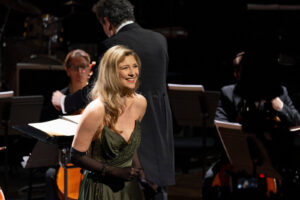
Opéra National de Paris Atelier 2023 Review: Carte Blanche
By João Marcos CopertinoGustavo Dudamel’s “Carte Blanche” concerts often problematize the contamination of all music by opera. I use “contaminate” in the best sense, since opera, according to Matthew Aucoin, has the capacity to aggregate and change all the arts involved in its making: theater, music, literature, and visual arts: they will never be the same.
The latest “Carte Blanche” concert was sold—auspiciously—as an excursion into the Latin American lyrical repertoire. The voices? These were strong students of the Paris Opera Atelier often heard as more minor characters at Opéra Bastille or Opéra Garnier, but listening to them singing solo, in a repertoire often dismissed by Opéra de Paris, raised my expectations.
I was not alone: the public was much more Latin than usual. In fact, in Garnier’s orchestra seats, it was easier to hear Portuguese than French! The promise of a Latin American night, however, was disappointing. Dudamel opted to fill half of the night with scenes of Bernstein and Weill’s stage works and many Spanish composers. Nothing against Enrique Granados and Fernando Obradors, but Dudamel knows Spain is not in Latin America. And “West Side Story” is not a Latin “Porgy and Bess.” After the performance, the promise of an evening of lyrical Latin American songs didn’t deliver.
Let’s put this aside because the night had great moments of lyrical voices singing an extremely tricky repertoire, even for seasoned singers. To sing in Portuguese and Spanish often requires different registers of the voice and a search for sounds that are not necessarily taught in a music conservatory. The vocal cast proved to have a good command of these registers and sounds all night, and Dudamel showed how generous a conductor he can be.
I particularly appreciated Martina Russomanno’s take on Villa-Lobos’ “Bachianas Brasileiras No.5.” Although the aria is standard repertoire for many sopranos, the whole piece, with its second movement, is not performed or recorded as often as it should be. The work requires a lyric soprano with great legato and strong Portuguese skills—along with the intelligence to emerge from the coloraturas with grace.
Russomanno seemed to have some butterflies in her stomach at the very beginning of the piece, but after that, she showed excellent command of Villa-Lobos’s style. First, she spoke nearly perfect Portuguese—which this critic would know to recognize! Few sopranos that are not Brazilian have managed to sing this Bachianas without destroying the language. I can count on one hand the North American singers (specifically U.S. singers) who have recorded Villa-Lobos with a “decent” pronunciation: Netania Davrath, Anna Moffo, and Ana María Martínez (conducted by Dudamel). Russomanno showed even greater care with the language than they did. She had the proper pronunciation of the vowels—which is very hard with the nasal vowels of Portuguese, as in “sertão,” “núvem,” and “transparente.” There was just one minor issue in the rolling of the “r” in “terra”—the correct “rr” would be guttural.
Beyond the language, Russomanno showed great musicality in her phrasing, and her pause at the end of the first movement was highly musical. And in the second movement, she invoked all the bird names properly, as if calling them would also be to incarnate their voice.
The rest of the night showcased singing in Spanish and English. The Bernstein pieces performed by Marine Chagnon and Margarita Polonskaya were scenically convincing and aimed to be at the balance point between opera and the belting musical. Bass Alejandro Baliñas Vieites, sang a vocal version of Piazzolla’s “Oblivion” with a microphone. He has charisma and a great instrument. Still, there were some issues in intonation, and the microphone did not showcase his talent well, especially when compared to his other songs, performed without a microphone throughout the night. This is not a matter of acoustic purism: to sing with a microphone requires much training and a favorable amplification system.
Finally, this “Carte Blanche” was the first time I saw an encore in the Opéra de Paris. Evidently, the singers had not prepared music for their encore, which rarely happens in these situations. So, they repeated their rendition of Kurt Weill’s “Ice cream Sextett” to much acclaim. Although all signers shone in this piece, it was evident that such a warm reaction was due to the scenic and musical control of tenor Thomas Ricart. His instrument is well-suited to his witty caricature of an Italian-American Ice-cream vender. His high notes in falsetto—and piano—were, along with Polonskaya’s coloratura, asking for some vanilla, were the charms of the night.
Bravo to Dudamel’s conducting. The repertoire could have been Latin American for a change, but his conducting was extremely efficient, and the orchestra sounded better than in “Tristan” or even in “Tosca.”
Although the repertoire could have been more inclusive and genuinely engaged the Latin American repertoire—as was promised—the night had great moments, and it is not usual to hear such an enthusiastic encore—and such great Villa-Lobos.


